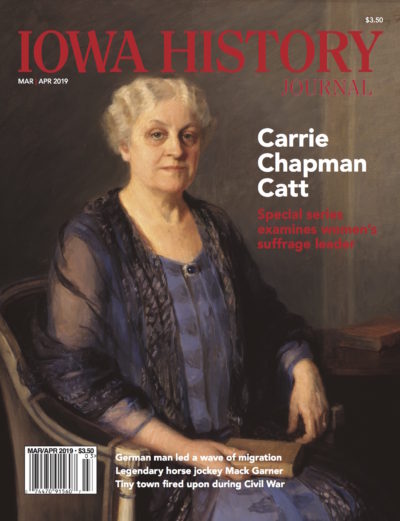Special series examines groundbreaking work of women’s suffrage leader
Part 1 of 3
(Publisher’s note: Part 1 of Iowa History Journal’s special three-part series about Carrie Chapman Catt includes her Iowa roots and early work in the national women’s suffrage movement. Part 2 will focus on her defeats and victories in our May/June issue. Part 3 will focus on her work to help the passage of the 19th Amendment and her legacy in our July/Aug issue.)

Photo courtesy of the National Portrait Gallery, Smithsonian Institution; transfer from the National Museum of American History; gift of the National Women Suffrage Association through Mrs. Carrie Chapman Catt, 1939
By Jerry Harrington
When Carrie Lane was 13 years old in 1872 and living in rural Charles City, she witnessed her father and the farm’s hired man dressing up to go on a special trip into town. They were leaving to vote in Charles City.
Sensing this was a special occasion, Carrie turned to her mother and asked why she, too, was not dressing up and was surprised when her mother told her she wasn’t going. “Then how,” asked Carrie innocently, “are you going to vote?”
The whole family, including her mother, laughed at her. Young Carrie was stunned. She saw nothing — absolutely nothing — funny about it and fumed at the unfairness. Why could men cast ballots and not women?
At that time in the United States, women were forbidden to cast votes in any election. Only males held that right. It would not be until nearly 50 years later that all women in the U.S. would gain the franchise. One of the towering personalities who led this fight for women’s right to vote — against the entrenched forces of prejudice, sexism and financial and political interests — was this young girl from rural Iowa, later known as Carrie Chapman Catt.
Catt was a striking force in the U.S. in her efforts for women. Not only did she lead the battle for women’s suffrage, but she also fought for women’s equality in property rights, wages, education and other significant areas.
She did not limit her talents to serving the nation. She used her forceful rhetoric and impactful personality to offer women on the international scene the hopeful message that they should be equal to men in politics and law.
The crowning glory of Catt’s public career was the passage of the 19th Amendment to the Constitution of the United States in 1920, granting all U.S. females the right to vote. At around this time, Catt’s creation — the League of Women Voters — was born, an organization dedicated to better government and civic education that exists to this day. Catt was also a significant figure in the worldwide peace movement, dedicated to eliminating the causes of war.
Catt is one of the truly significant and charismatic figures in U.S. history, one who courageously led the battle for political and economic rights for half the human population.
TO READ THE ENTIRE STORY AND OTHER FASCINATING STORIES ABOUT IOWA HISTORY, subscribe to Iowa History Journal. You can also purchase back issues at the store.
